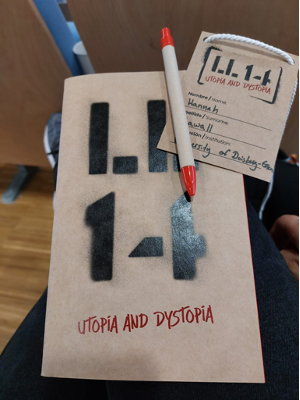The 14th Linguistic Landscape Workshop was held in Madrid from 6-8 September 2023. With the motto “Utopia and Dystopia”, the conference brought scholars interested in the field of linguistic landscapes (LL) from all around the world together - and thanks to the Seed Grant program of the Junge Sprachwissenschaft e.V., I was able to travel to Spain as well! This gathering of LL enthusiasts provided an excellent platform for junior researchers like myself (currently a master’s student) to engage in meaningful discussions, make new connections, and be inspired by the latest developments in the field. In this blog post, I will take you through my journey at the conference and share some of my highlights.
My experience started with a pre-conference workshop at La Corrala, which is the cultural center of the Universidad Autónoma de Madrid, a beautiful historic building that is also home to the Museum of Arts and Popular Traditions. I participated in a workshop titled “Protest and Activism in the LL”, which was conceptualized by Elana Shohamy and Iair Or and led by Iair Or and Luisa Martín Rojo. Since some of my own work in the area of LL centers around pride parades, this workshop tailored specifically to junior researchers was a fantastic opportunity to discuss my own research with peers, exchange feedback, and workshop new project ideas. The following welcoming-reception provided a good opportunity to continue the conversations started in the workshop but also to meet other (more senior) scholars who were eager to share their own experiences with the field of LL.
On the first official conference day, all participants were given a lanyard to show their name and affiliation as well as a notebook and pen to capture their thoughts. In accordance with the theme “Utopia and Dystopia”, the organizers brought awareness to the ongoing climate crisis and aimed to make their choices as environmentally friendly as possible, which was reflected in the organization of the event, for example by making virtual attendance possible for researchers who cannot travel to Spain, and using sustainable materials for lanyards (see fig. 1).

LL14 featured a series of inspiring talks that covered a wide range of topics. Listening to experts in the field discussing their research and being able to engage in this discussion was educational and motivated me to engage more deeply with theory as well as methodology. For example, Onna Segev’s talk on toilet signs in Tel Aviv informed me about signs’ production processes, which can be a valuable background for the analysis of signs, and how findings from the discipline can be used to improve the status quo. The panel on Gender and Sexuality in the LL engaged with the question where queer people can be found in the LL and which binary explanatory frameworks are being used and should be overcome in our studies. David Malinowski’s presentation made me question the representativeness of social media data, and Mike Mena criticized the status of English as the language of power and the accompanying - what he called - “softer forms of linguistic terrorism”. Overall, many of the talks deepened my engagement with the concept of taking up space, but they also clearly identified many research gaps that are yet to be filled.
One of the most exciting but also intimidating aspects of the conference was the opportunity to present my own research and give my first ever in-person conference talk titled “From Kaiser to Rosa: A Diachronic Analysis of Gendered Street Names in the German City Frankfurt (Oder)”, co-authored by Seraphim Alvanides. This work based on my bachelor’s thesis proposed a new coding-scheme for the analysis of gendered street names and used comparative visualizations of results to show an overwhelmingly male-dominated streetscape on maps at different timepoints. Giving this live presentation was a valuable experience that allowed me to receive constructive feedback and refine my work, for example by including names of other public places in relation to the names of their streets in the analysis.
The conference closed with a so-called “business meeting” which is intended to spark reflection on the current and discussion of future conferences. The meeting was open to everyone, and therefore I chose to attend as well. It provided a valuable glimpse behind the scenes of conference organization and all the different factors that need to be regarded in order for a conference to be successful.
During the workshop, I was always able to find a friendly face to talk to. Engaging in conversations with people from all different backgrounds both academically and regionally allowed me to network and form connections that may even lead to future collaborations. I would like to thank Junge Sprachwissenschaft e.V. for their support and I am looking forward to 2025 when the LL workshop will find its way to my home university, the University of Duisburg-Essen.